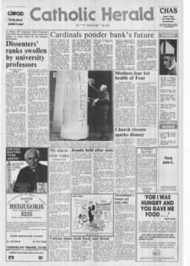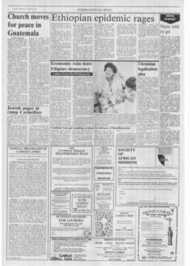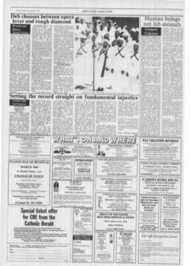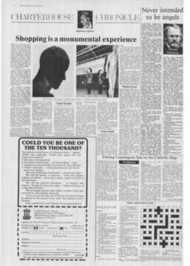Page 5, 10th March 1989
Page 5
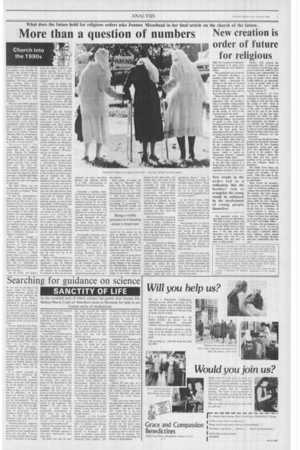
Report an error
Noticed an error on this page?If you've noticed an error in this article please click here to report it.
Tags
Share
Related articles
2002 A Testing Year
A Bishop Is Also A Priest
Bishops Oppose Designer Babies Decision
Archbishop Winning Chairs 'human Life' Committee
Bbc Tv Is Looking At A New Relationship Between Science...
Searching for guidance on science
SANCTITY OF LIFE
In the troubled area of where science has power over human life, Bishop Mario Conti of Aberdeen turns to Newman for help in our Lenten series of meditations.
IT was once my privilege to be shown round the rooms of Cardinal Newman. Among the exhibits was his cardinal's hat with its huge brim. What a comical object. It doesn't look calculated to actually fit any human head. Yet it symbolises so much as it sits there, a great -red seal of approval on the life of a man who, it seems to me, is able to offer much kindly light to those who find as I do, so much confusion in the Church of our times.
We have listened to the Pope, we have read of theologians who disagree with him, we have tried to understand Fr Haring. Some of us may have seen fellow Catholics give up and take as their guide in life "What I feel, like" or, a little more respectably, "My conscience."
Most of us are neither theologians nor philosophers, nor have we the brains or time to become such. Yet we face moral choices every day of our lives which the experts discuss and disagree about. What kind of guidance can we expect of the Church?
In a sermon preached at Oxford the Anglican Mr Newman once said: ". . .From the nature of the case, imperfect beings, as we are, must always be, on the whole, in a state of darkness." He continues by telling us that, as every science has its difficulties, we must expect the science of living to have them as well. He gives a rule for the perplexed: "To all those who are perplexed in any way soever, who wish for light but cannot find it, one precept must be given-obey, It is obedience which brings a man into the right path, it is obedience keeps him there and strengthens him in it."
Newman, therefore, addresses his words not to those who are determined to live their lives according to their feelings but to those who seek light. "1 do my own thing; nobody tells me what to do" is the motto of the pagan
and nothing to do with trying to be a follower of Christ.
Newman, however, was quite clear about rank and order in authority. His famous reply: "I Shall drink, to the Pope, if you please, still-to conscience first, and to the Pope afterwards," is an indication of this.
As a Catholic Newman held to the rule, in essentials unity, in other things freedom. Things taught with the fullest authority he accepted wholeheartedly. The choice was simple, either accept or cease to be a Roman Catholic. Such was his attitude to the doctrine of the Immaculate Conception which Pius IX defined in 1854. Such was his attitude to the definition in 1870 of papal infallibility. This was despite the fact that he had considered it a bad time for defining such a doctrine.
On this point, however, he had a wide historical vision of the Church. This made him aware of the limitations of the Pope's authority. Not everything the Pope said was infallible. This was clear since Popes in history had said things that ought not to have been said and certainly done things they ought not to have done. As Newman wrote in the magazine The Rambler: "At one time the Pope, at other times a patriarchal, metropolitan or other great see, at other times. . . councils, said what they should not have said or did what obscured and compromised revealed truth".
Pius IX was said to have been personally offended by this statement. Newman repeated it with some clarifications some years later.
His point was that the laity too have received the Holy Spirit. The fourth century may have been an exceptional time. Normally it may be the case that the Church's tradition is held up clearly by the teaching Church. This era, however, showed many of the bishops failing in their duty whilst in contrast the laity played their part well and showed the way.
At baptism we all received the Spirit. The effect is not to paralyse us from the neck upwards nor to make of us performing parrots. Newman illustrates this in his approach to some of the less authoritative guidelines of the Church. The question of English Catholics going to the Protestant Universities was very topical in the 1860's. The English bishops had issued a strong dissuasive letter which was practically a prohibition. Not long after, the young Gerard Manley Hopkins travelled from Oxford to Birmingham where he was received into the Church by Newman who advised him in the circumstances to continue with his studies and get a good degree which Hopkins proceeded to do.
Such was the weight attaching to conscience for Newman that it was for him clear that, should a Pope give orders which seem to anyone wrong, after prayer and taking counsel, such a person should disobey.
However, a true Catholic "must have a generous loyalty to ecclesiastical authority" and the spirit of publicly contradicting the pronouncements of the teaching Church was quite foreign to Newman's style. There is nothing hypocritical about disagreeing in private yet remaining silent publicly. The Church is a body so varied that an entirely uniform detailed set of directives for all must seem ridiculous as soon as it is suggested. Theologians with little pastoral experience, letting their theological hair down in public in defiance of a Pope's teaching are not a pretty sight and can cause real scandal to less sophisticated minds.
Catholics who disagree with pronouncements of the teaching Church, Newman indicates, should keep quiet. Thus when the "Munich Brief" of Pius IX seemed to deny scientists the freedom which Newman considered their right in the researches, he concluded that he ought not to write anything on the problems of the time which came from the developments of science: "It is simply a providential intimation to every religious man that, at this moment, we are simply to be silent."
Almost 30 years ago, as a student, I picked up for a few pence in a second hand shop an old volume entitled: Selection from the Parochial and Plain Sermons by John Henry Newman.
I have ever since come under the spell of the writer and felt his good wishes addressed to me personally. I am one of those who would like to see him canonised so that his teaching may enjoy the highest endorsement that the Church can give it. Many who feel as I do pray for his cause, many become "Friends of Cardinal Newman" to keep in touch with its progress and to refresh their minds with his teaching. This can be done by contracting the Oratory at Birmingham.
blog comments powered by Disqus


